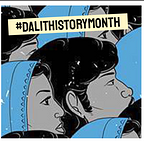Celebrating a Visionary Educationist — Jai Bai Chaudhary
This post was researched and written by Anita Bharti and is an adaptation and translation of her piece on StreeKaal. Anita Bharti is a towering figure in Hindi literature. She is a well-known poet and writer while also being a frontline member of the anti-caste movement for decades. She has written several award-winning books including — Samkaleen Naarivaad Aur Dalit Stri Ka Pratirodh (Contemporary Feminism and Resistance of Dalit Women), the biography of Gabdu Ram Balmiki, Ruksana ka Ghar (Ruksana’s Home) and Yatha Stithi Se Takrate Hue (The Clash With the Status Quo) — a collection of stories, poetry, and critique by a Dalit woman, are among many others. Anita has also edited and translated into Hindi, the poems and works of Savitribhai Phule. * You can reach her at anita.bharti@gmail.com.
Translation and editing were contributed by Mariya Salim.
Jai Bai Chaudhary was a powerful revolutionary leader of the Dalit movement. Born in the Mahar community, she stood for the education of young Dalit girls and was one of the first Dalit woman principal to open a girl’s school named the ‘Chokhamela Kanya Paathshalaa’ (Chokhamela Children’s School). Her work carried forward Savitribai Phule and Babasaheb Ambedkar’s tradition of knowledge production and dissemination. Her contributions and the story of her struggles and achievements are not very well known and it is the Dalit History Month’s endeavour to let her life’s achievements and struggles be known and celebrated.
Jai Bai Chaudhary was born on May 2, 1892, at Umred, 15 km from Nagpur in Maharashtra. Affected by the famine of 1896, with no employment and hardly anything left to survive on, her parents took her and moved to Nagpur in search of employment. It was here that with great difficulty she was able to complete her primary education. She was married off to Bapuji Chaudhury at the tender age of 9. Her husband’s family was financially in very bad shape and to help, she started working as a ‘coolie’ at Nagpur station. At a time when she should have been studying and playing with children her age, Jai Bai was carrying heavy luggage of passengers between Nagpur and Kaamti station, almost 10km from one another! Coincidentally during these days of immense struggle, Miss Gregory, a local missionary woman, noticed her one-day carrying passengers bags and started a conversation with her. Impressed with her knowledge and after finding out that she was educated enough to teach small children, Miss Gregory was determined to help her. Thereafter, Jai Bai was employed as a teacher at a missionary school at Timki, near Nagpur, for a salary of 4 rupees a month.
Sadly, she could not continue at this position for too long as the parents of the children at the school refused to send them to it after finding out that she belonged to an ‘untouchable’ caste. This was a turning point in Jai Bai’s life and she decided to take on the social evils of caste and untouchability head on! Education is an important tool in being able to flight caste oppression and she decided to spend her entire life educating the ‘untouchable’ children of her community to ensure they can live a life with dignity. She went from home to home, encouraging parents to send their children to school and in 1922, she started a school called ‘Chokhamela Kanya Paathshaala’, after the name of Saint Chokhamela, a saint from the untouchable community. This school is presently being run by her grandson Sudhakar Shravan Chaudhury and continues to educate young girls even today.
Jai Bai’s dedication to education also finds recognition in the world famous Dalit literary writer, Kaushalya Baisantri’s autobiography titled ‘Dohra Abhishaap’ (Doubled Curses). In it, she gives credit to Jai Bai for encouraging her to study, become a social activist and an independent personality.
Jai Bai’s emphasis on the need to treat women and men equally was apparent in her 1930 address to the Akhil Bhartiya Dalit Congress’s first convention where, while representing Dalit women, she said loud and clear, “Girls should be provided full opportunities for education, like boys. Through the education of a girl, the whole family becomes educated”.
In December of 1937, she was invited by the Akhil Bhartiya Mahila Parishad to attend their convention and during the same, she faced discrimination from the upper caste feminists running the program. She was made to sit far away from the dining area. To protest against this discriminatory behaviour and outright casteism and insult and to hold them accountable for it, Jai Bai along with thousands of Dalit women organised a meeting on January 1st, 1938, attended by scores of Dalit women where she discussed the same and they stood as one voice in opposition to caste-based discrimination against Dalit women by upper caste women. It was in this meeting that Ramabai established a ‘Mahila Sangh’ and this group also decided to start a night school for Dalit women.
The Dalit women’s movement will remain forever indebted to the work and struggles of Jai Bai Chaudhury who devoted her entire life to the cause of the community. Maharashtra today boasts of a robust Dalit women’s movement and its understanding of injustice and caste oppression, of the importance of education, the power to revolt against injustice: all these can be attributed to the years of work and dedication of many women like Jai Bai. As long as there is injustice, oppression, illiteracy, we will continue to look up to Jai Bai and her struggles as a burning flame whose light will bring strength to our lives and struggles.
